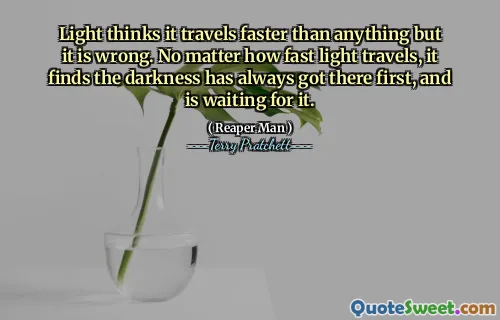
I AM ALWAYS ALONE. BUT JUST NOW I WANT TO BE ALONE BY MYSELF.
This quote from Terry Pratchett's Reaper Man captures a nuanced distinction between different types of solitude and the emotional experiences tied to them. At first glance, the phrase "I am always alone" suggests a state of ongoing isolation, which can often carry negative connotations of loneliness or exclusion. However, the second part, "But just now I want to be alone by myself," deepens this notion by implying a conscious desire for solitude, a voluntary retreat into oneself that is not driven by circumstance but by choice. This highlights an important difference between being alone as a default condition and seeking solitude for personal reflection or rejuvenation.
Such a line resonates deeply in our modern world, where being alone can sometimes feel like a burden, especially when social connections are highly valued or pressured. Yet, the yearning to be alone intentionally underlines the human need to disconnect, to find peace amidst the chaos, to reconnect with one’s inner world without distractions. It's an acknowledgment that solitude is not merely the absence of others but a positive, even necessary sanctuary for self-awareness, healing, or contemplation.
Pratchett's wording emphasizes the ambiguity and complexity of solitude—there is existential loneliness, which can be heavy and undesirable, and there is chosen solitude, which can be healing and empowering. This insight invites readers to reconsider their relationship with being alone, recognizing that solitude, when embraced, can be a powerful act of self-care and self-understanding in a noisy, interconnected world. It reminds us that sometimes, being "alone by myself" is not a lonely state, but a profound expression of autonomy and tranquility.







